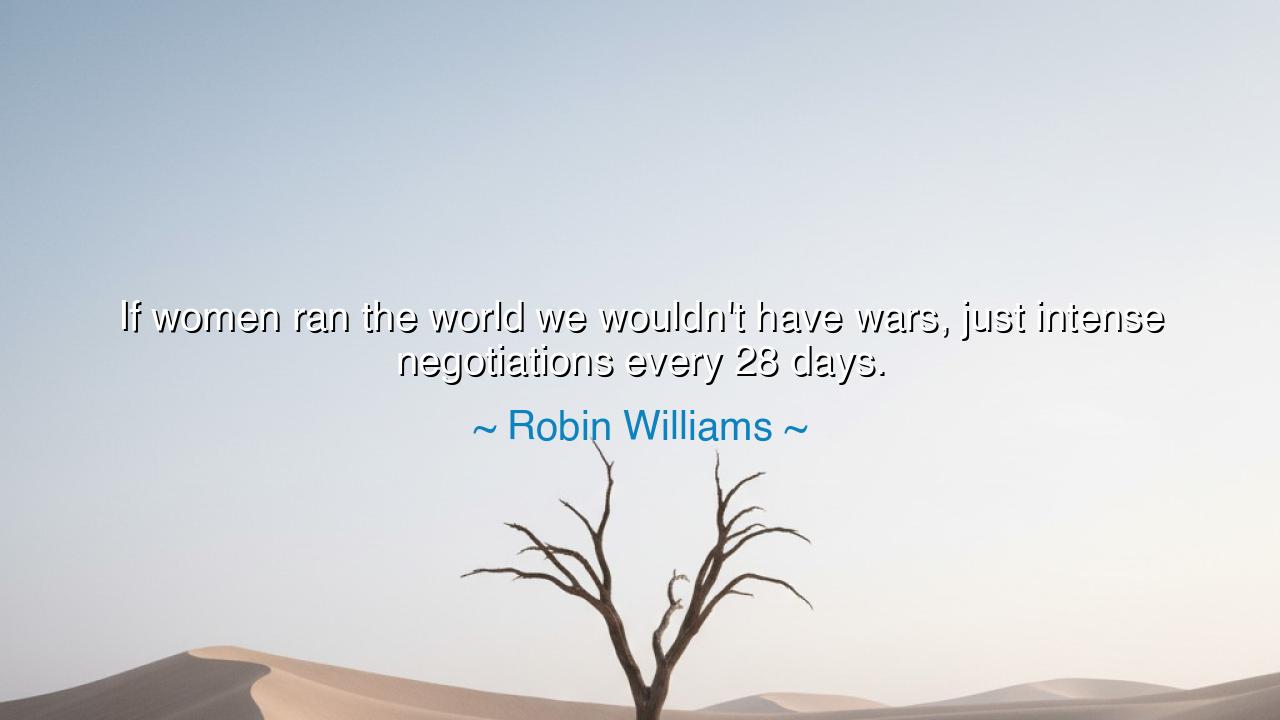
If women ran the world we wouldn't have wars, just intense






In the great sweep of history, the eternal struggle for power has often been defined by conflict—battles waged on fields of war, within the courts of rulers, and even within the hearts of those seeking to define their place in the world. Yet, there are moments when humor sheds a revealing light on the nature of power and the dynamics of governance. Robin Williams, the beloved comedian and philosopher, once quipped, “If women ran the world we wouldn’t have wars, just intense negotiations every 28 days.” In this playful remark, Williams not only invites us to laugh, but also nudges us toward a deeper reflection on the qualities that distinguish the way women and men approach conflict, leadership, and decision-making.
In the ancient world, warfare and battle were seen as the ultimate tests of a ruler’s strength and wisdom. Alexander the Great, whose conquests shaped much of the ancient world, built an empire through a mixture of strategy and force. Yet, even Alexander understood the importance of diplomacy and negotiation—he frequently sought the counsel of wise leaders, and his success was not solely due to the might of his army, but to his ability to secure alliances and navigate the complexities of human relationships. Williams' quote humorously suggests that in a world where women held the reins of power, these qualities of empathy and negotiation might be the means by which differences are resolved, avoiding the escalation to war that so often marks the choices of traditional male-dominated leadership.
The concept of negotiation over conflict can be found in the teachings of the ancient Romans. Cicero, the great statesman and philosopher, believed that the most effective form of leadership was rooted in reason, not in the use of force. He argued that the art of oratory—the ability to speak persuasively and negotiate effectively—was the true mark of a wise leader. In his time, leaders such as Julius Caesar were often celebrated for their military conquests, but Cicero’s own legacy lives on through his words, his attempts to foster peace through dialogue, and his insistence on the power of reason to resolve disputes. Williams' words, in a way, reflect the value of negotiation and diplomacy over the chaos of war, suggesting that women, often seen as the nurturers and mediators in societies, might possess an inherent ability to defuse tensions before they reach the point of no return.
The biological cycle of women—symbolized by the 28-day rhythm of the menstrual cycle—offers an interesting metaphor for the patterns of human conflict and resolution. Just as the moon waxes and wanes, so too do the emotions and tensions that arise between people. Negotiation, as Williams suggests, may be less about the dominance of one party over another, and more about finding balance, understanding, and mutual respect. The rhythm of the menstrual cycle has often been seen as a symbol of balance, a reminder that life moves in cycles and that conflict can, and often should, follow a natural progression of release and resolution. The humor in Williams' words underscores the idea that while women might not seek war, they may engage in regular, if intense, negotiations, guided by an intuitive understanding of timing, empathy, and the need for compromise.
The lesson in Williams' quote is not to belittle the concept of warfare or leadership, but to invite us to think more critically about the approaches we take toward conflict resolution. The ancient wisdom of dialogue, mediation, and reasoning must be brought to the forefront, especially in a world that has often relied on violence to settle disputes. Women, historically marginalized in many leadership roles, may possess the qualities of compassion and understanding that offer alternative solutions to the brutal tactics often employed by traditional power structures. Whether or not women would actually rule the world differently is a subject of much debate, but the qualities of negotiation, understanding, and compromise that women often bring to the table are certainly qualities that the world could use more of.
In our own lives, we must ask ourselves how we approach conflict. Do we default to violence, whether physical, emotional, or psychological, as a means of asserting our power? Or do we seek to resolve differences through dialogue, understanding, and compromise? The ancient philosophers, from Plato to Socrates, emphasized the importance of reasoning and debate as the foundation of justice and leadership. Similarly, Williams' humor challenges us to reconsider how we might approach leadership and resolution in our own lives—not through force, but through the wisdom of understanding and mutual respect.
Thus, the practical action we can take is to embrace negotiation over confrontation. In our personal relationships, in our work, and in the broader world, let us strive to cultivate a culture of dialogue and compromise, where empathy guides our decisions and understanding shapes our actions. Just as the ancients taught that true leadership arises from wisdom and balance, so too should we seek to lead lives that prioritize the value of peaceful resolutions over the destructive path of conflict. Let us remember that power is not merely the ability to dominate, but the capacity to unite, to resolve, and to transform, even the most intense negotiations, into opportunities for growth, understanding, and peace.






AAdministratorAdministrator
Welcome, honored guests. Please leave a comment, we will respond soon